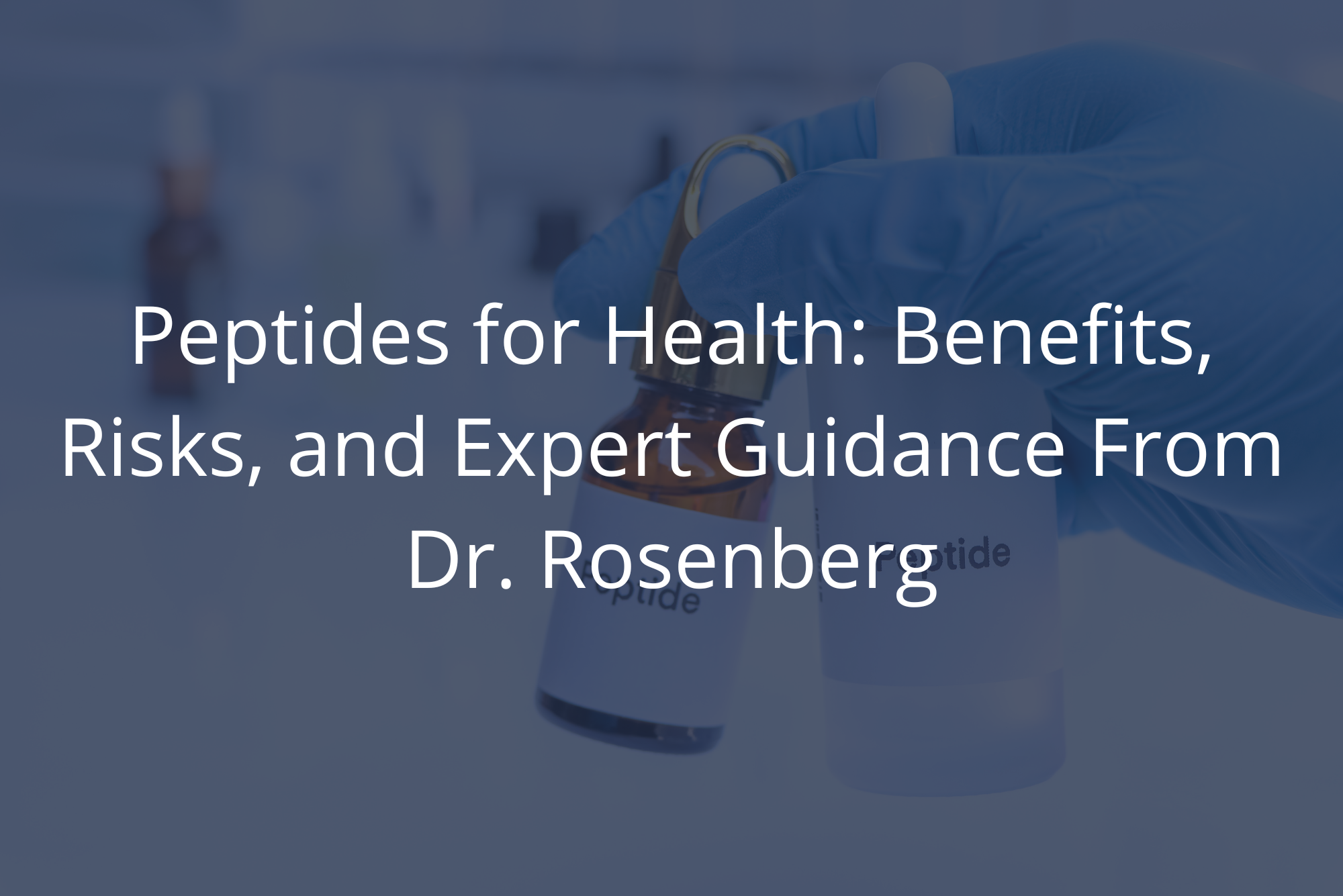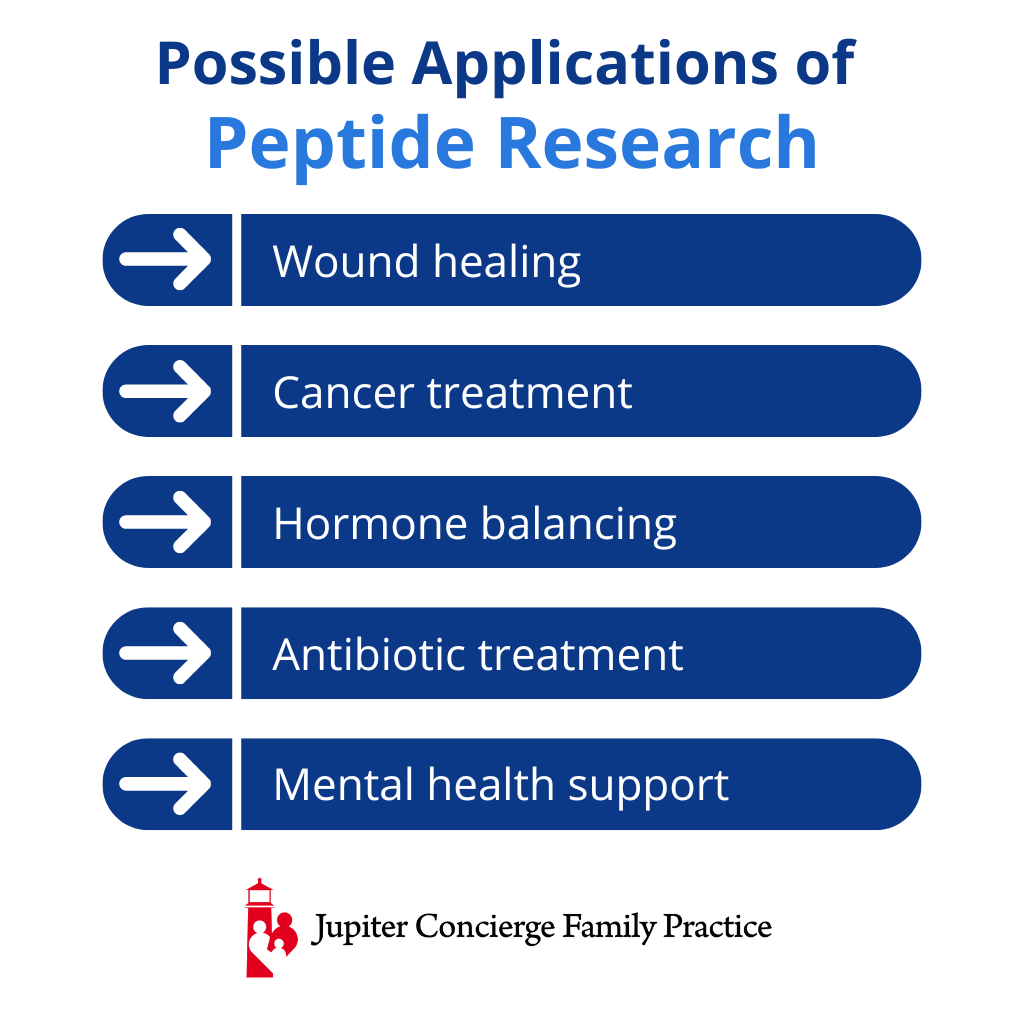
Even if you don’t recognize them by name, you’ve probably heard of peptides. Insulin is one. Semaglutide, better known as Ozempic, is another. These are just two of the dozens of peptides used in medicine today.
So, what are peptides? What do peptides do for the body? And are peptides good for you?
Let’s dig into what I’ve been seeing and why peptides are creating both excitement and concern in medicine today.
What Are Peptides, Exactly?
Peptides are short chains of amino acids. When you eat protein, your body breaks it down into amino acids, which you then use to form peptides. Today, scientists also use amino acids in a laboratory setting to make synthetic peptides for medical uses.
Since scientists discovered the natural peptide insulin in 1921, our understanding of peptides has evolved significantly. In fact, we now realize that peptides stimulate nearly every process in the body.
Peptides attach to cells, sending them signals: Go fight that virus! Go build that tissue! They act like hormones and growth factors, and they help regulate immune function, inflammation, healing, and more.
What do peptides do for the body? Just about everything.
Peptides at Work in Modern Medicine
Besides insulin, semaglutide is one of the more popular examples of a peptide drug in use today. This GLP-1 (glucagon-like peptide-1) agonist was originally developed for diabetic patients, working to lower their blood sugar and reduce appetite. A surprisingly positive and notable side effect of the drug was how much weight patients lost, leading to its approval for weight loss today.
But GLP-1 drugs are just the tip of the iceberg. Peptides are being considered to help heal wounds, treat cancers, and correct hormone imbalances. And exciting new research shows promising opportunities to replace traditional treatments with peptides that cause fewer side effects.
For instance, peptides are currently being studied as alternatives to conventional antibiotics, potentially offering the same benefits with fewer downsides.
Research is also being conducted on how peptides impact the neurotransmitters that influence emotion and mental health. There’s hope that peptides could provide better treatments for mental health conditions with fewer side effects than current pharmaceutical options.
Exercise Caution With Peptides!
As exciting as all this is, we have to be careful. Just because something is natural or comes from a lab doesn’t mean it’s safe.
Thanks to the internet, peptides are widely accessible, but this accessibility comes with risks. Many peptides are manufactured without proper quality assurance, potentially leading to contamination and complications.
Some peptides are sold online in powder form, meant to be reconstituted at home. But these products are dosed in micrograms, an extremely small unit, meaning any error in mixing or measuring could have dangerous results.
A peptide can carry real risks even when manufactured and dosed properly. I recently had a patient who was given a GLP-1 for obesity. It was prescribed appropriately, but within hours, they developed a bowel obstruction that required hospitalization.
Or, consider peptides that stimulate growth hormone. While they can help people get stronger and heal faster, their effects can also be indiscriminate. If you have an undetected cancer brewing in your body, for example, peptides may stimulate growth there as well.
Every action has a reaction, which is why you always need to carefully evaluate the risk-benefit ratio of any drug you’re considering in coordination with your doctor.
Why Supervision Matters for Peptides
Peptides are complicated. They can be taken by mouth, injected, or applied to the skin. They can also be used in combination, which complicates matters.
That’s why I strongly recommend only using peptides under the direction of a board-certified physician who understands how they work — and what can go wrong.
Sophisticated drug marketing tosses out promises like “build muscle fast” or “feel better instantly,” making people think peptides are the answer they’ve been looking for. The truth is, they’re powerful tools. But when used incorrectly, they can do more harm than good.
So, are peptides good for you? They can be. But only when used responsibly, under supervision, and for the right reasons.
Peptides and the Road Ahead
We’re just scratching the surface of what peptides can do. Research into their role in neurotransmitters and emotional regulation is especially promising. There’s hope that one day we’ll have more effective, lower-risk treatments for anxiety, depression, and other mental health conditions — all thanks to peptides.
Still, we need to approach them with caution. The science is young, and their popularity is growing faster than our understanding. The potential for misuse is very real.
If you’re considering peptides, make sure you work with a qualified physician. That’s the only way to get the benefit while minimizing the risk.
So, what are peptides? They’re powerful messengers. What do peptides do for the body? Almost everything. Are peptides good for you? Potentially, but only when handled with care and expertise.

Dr. David Rosenberg
Dr. Rosenberg is a board-certified Family Physician who obtained a BS in Chemistry at Georgia's Mercer University in 1983 and a medical degree from the University of Miami in 1988. He completed his residency in Family Medicine at The Washington Hospital in Washington, Pennsylvania, in 1991 and then practiced Emergency Medicine at Palm Beach Gardens Medical Center for two years. In 1993 he started private practice in Jupiter.
Dr. Rosenberg has been married to his wife Mary for 38 years and they have three grown children together. Some of his interests include being a huge baseball fan, sailing, snow skiing, self-development, and learning to play piano.


